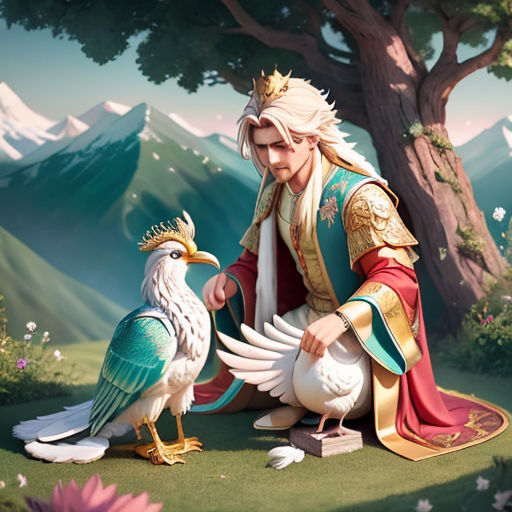
Zal and the Simorgh
By Guita

01 Jul, 2023

In the far reaches of a distant land, named Persia, a king named Sam ruled his kingdom with an iron hand. Though stern and commanding, the king had a soft spot for children. He dreamed of the day he would have a child of his own to share his throne with.

King Sam's prayers were finally answered when, after much wait, his wife gave birth to a son. The royal family was overjoyed and celebrations started immediately across the kingdom. But the joyous atmosphere was cut short when they saw the baby.

The baby boy, born to a lineage of the darkest-haired kings, was starkly different from his ancestors. His hair was as white as the snow that caps the peaks of the Alborz Mountains. This was not considered usual or even acceptable among the people of their land.

King Sam was shocked and angry. A baby with white hair was considered a bad omen in the kingdom. Repelled by his son's unusual appearance, the King named him Zal, which meant 'white,' and then he made a terrible decision.

He ordered his men to take Zal to the frigid and menacing Alborz Mountains, leaving him to the fate of the wild. His heart might have ached, but his insistence on adhering to strange traditions won, and he turned his back on his only son.

In the grand mountain ranges, Zal's cries echoed through the silence, attracting a legendary magical creature known as Simorgh. She was a phoenix-like bird with radiant feathers and a heart full of compassion.

Simorgh found the abandoned baby, shivering and crying. Her motherly instincts kicked in, and she protected Zal. She wrapped him in her warm wings and fed him. Simorgh adopted Zal, caring for him as if he were her own.

Years passed, and under the loving care of the Simorgh, Zal grew into a strong and handsome young man. Simorgh thought him all the knowledge of the world and told him all the stories that was ever told. Zal was grown up so wisely and with the good heart of Simorgh.

Back in the kingdom, King Sam was tormented by guilt and regret. He realized how terribly he had erred in abandoning his son. He yearned to make amends and desperately hoped that Zal had survived against all odds.

He sent his best men to search the mountains for any sign of Zal. They traversed through treacherous terrains, battled harsh weather, and searched every nook and cranny of the mountains.

They finally stumbled upon Zal. It was a miraculous sight. Zal, standing tall with his snow-white hair glistening in the sunshine. He was now a young strong and handsome man.

Upon finding Zal, the guards were taken aback by his wilderness and beauty. They quickly relayed the news back to King Sam, and he was filled with a profound relief. He was eager to meet his long-lost son.

King Sam apologized for his actions and tried to express his regret. He begged Zal to return to the palace, pleading for his forgiveness. However, Zal was torn. The mountains and the Simorgh were his home and his family.

Simorgh, understanding the situation, gently coaxed Zal to reunite with his father. She assured him that he would be happier with her father. She gave him one of her feathers and told him to burn it if he ever needed her help.

With a heavy heart, Zal bid farewell to Simorgh and his home in the mountains. He felt a deep sense of gratitude for Simorgh and promised to carry the lessons and love he received from her into his new life.

He returned to the palace with his father. His arrival was met with a grand celebration. The people were captivated by his wilderness and his rare beauty. Regarded as a living legend, Zal was accepted and respected by his people.

In the palace, Zal adjusted to the his life and became one of the best warriors of the country. His inherent kindness coupled with his wilderness made him a fair and respected leader.

Zal’s story became a legend. People respected and loved him. But in his heart, he missed the freedom of the mountains and the love of Simorgh. The tale of a white-haired prince, abandoned in the mountains, raised by a magical bird, who went on to lead his kingdom with valor and wisdom.

His life was proof that differences could indeed be blessings, and not curses. King Sam learned a significant lesson about accepting differences. He regretted his initial decision but was grateful that Zal had grown into a remarkable leader.

The kingdom prospered under Zal's leadership, and the tale of their white-haired prince spread far and wide. Even today, if you visit Persia, you will hear folks retelling the legendary tale of Zal - The White Haired Prince. Zal was the father of one of the greatest warriors of Persia, Rostam.

The story of Zal is featured in Shahnameh, from Ferdowsi, the great poet. The Shahname, literally meaning 'Book of Kings,' is structured according to the mythical and historical reign of 50 Persian Kings. The stories passed down from chest to chest..." Persian saying